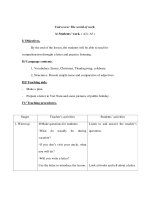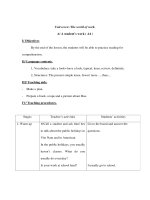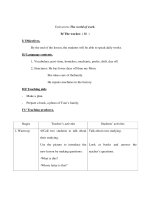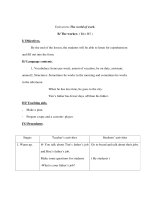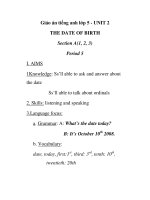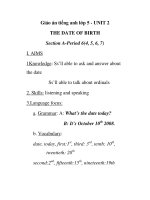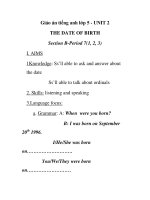Giáo án tiếng anh lớp 7: Unit seven: The world of work doc
Bạn đang xem bản rút gọn của tài liệu. Xem và tải ngay bản đầy đủ của tài liệu tại đây (49.52 KB, 14 trang )
Unit seven: The world of work.
A/ A students’ work. (A1)
I/ Objectives.
Bu the end of the lesson, the students will be able to speak about a
student’s work and vacations.
II/ Language contents.
1, Vocabulary: to be late for , that takes about , vacation,
summer vacation= summer holiday, last.
2, Structures: present simple tense, simple future tense and
comparative of adjectives.
III/ Teaching aids.
- Make a plan.
- Prepare some pictures of the summer vacation’s students.
IV/ Teaching produres.
Stages Teacher’s activities Students’ activities
1, Warm up
2, Presentations
@Make some questions for
students:- What time do your
classes start and finish?
-Do you like a summer
vacation?
-When will you have a summer
vacation?
Now you listen a conversation
between Hoa and her uncle.
Show the picture and ask
questions: Where are they?
What are they doing?
@Play the tape and ask students
listen to it carefully.
Play it again and have students
read the dialoge.
Have students work in pairs.
Ask the pairs to role- play the
dialoge and severe the roles.
Have one or two pairs role-
play in front of the class.
Listen and correct their
mistakes if they have.
Listen and answer the questions:
( by students )
Yes, I do.
In June.
Look at the picture and answer the
teacher’s questions:
They are in the kitchen and they
are eating breakfast.
Listen to the tape.
Read the dialogue white listening.
Work in pairs.
Role- play the dialogue in front of
the class.
Rewrite the meaning of the new
words.
Read these new words.
3, Practice
4, Production.
5, Homework
Explain the meaning of the new
words: to be late for , that
takes about , vacation,
summer vacation, last.
@Ask students to look at these
questions and read them.
Then have them work with a
parner. Tell the students that the
answers are in the unit dialoge.
Have some pairs practice in
front of the class.
Listen and correct their
mistakes if they have.
*Hoa does her homework 2
hours a day.
*That takes about 2 hours each
day.
*Hoa will visit her parents on
the their farm during her
vacation.
@Make questions for students:
-What time do your classes start
-Do your classes start earlier or
later?
-For how many hours a day do
you do your homework? Do
you work fewer than Hoa?
-When will you have a
vacation?
-What will you do during the
vacation?
Then ask students to work with
a partner, and have them role-
play it.
Listen and correct their
mistakes.
@Learn by heart .
Rewrite all the answers into
notebooks.
Prepare next lesson.
Look at the questions and read
them.
Work in pairs.
Ask the questions in front of the
class.
Rewrite the correct answers into
the notebooks.
Answer about yourself.
( by students ).
Others listen and talk about
yourself.
Work with a partner.
Rewrite these homework into
notebooks.
V/ Draw experience.
Unit seven: The world of work.
A/ Students’ work. ( A2+ A3 )
I/ Objectives.
By the end of the lesson, the students will be able to read for
comprehension throught a letter and practice listening.
II/ Language contents.
1, Vocabulary: Easter, Christmas, Thanksgiving, celebrate.
2, Structures: Present simple tense and comparative of adjectives.
III/ Teaching aids.
- Make a plan.
- Prepare a letter in Viet Nam and some pictures of public holiday.
IV/ Teaching procedures.
Stages Teacher’s activities Students’ activities
1, Warm up
2, Presentation
@Make questions for students:
-What do usually do during
vacation?
-If you don’t visit your uncle,
what you will do?
-Will you write a letter?
Use the letter to introduce the
lesson.
Ask students to look at it, this is a
letter from American and it is a
letter from Viet Nam.
@Ask students to answer the
questions: -Who wrote this letter?
-Who did he write this
letter? -In your opinion, what
is the letter about?
Now you read this letter and
answer this question.
Have students read the letter, and
go around the class to help the
students.
Give the meaning of these words:
-hear, find, celebrate, Easter,
Thanksgiving, Christmas, like
Listen to and answer the teacher’s
questions.
Look at books and tell about a
letter.
Look at this letter and answer the
questions:
-Tim wrote this letter.
-He wrote this letter to Hoa.
( Students can guess )
Read this letter.
Read these new words and write
them.
3, Practice.
4, Production
doing.
Call some students to read the
letter. Teacher listen and corrects
their mistakes if they have.
@Have the students work in pairs
by asking and answering these
questions.
Ask them to practice in front of
the class.
Give the correct answers:
-Summer vacation is the longest
in America.
-During his vacation, Tim spends
time with his family.
-Vietnamese students have fewer
vacations than American students.
*Can you name American
vacations that you have just learnt.
Now you look at these pictures
and talk about them.( you can
answer the question: Which
vacation is in the first picture?)
Play the tape and ask students to
write the name of the public
holiday in each of these pictures.
Play the tape again.
Ask students to give their
answers.
Then give the correct answers:
a. Thanksgiving.
b. Independence Day.
c. New Year’s Eva ( Day ).
d. Christmas.
Talk some sentences about these
public vacations.
@Now you talk about the
vacations in Viet Nam.
Teacher can make some
questions:
-How many vacations are there in
Practice in front of the class.
Work in pairs.
Practice these questions in front of
the class.
Write the correct answers into
notebooks.
Talk again these vacations.
Guess: which vacation is in each
picture.
Listen to tape and write the name
of the public holiday in each
picture.
Give the answers.
Listen to teacher.
Work in small groups
Answer the teacher’s questions.
5, Homework.
Viet Nam?
-What are they?
-What do you usually do on each
vacation?
Ask students to work in pairs,
then write on the papers.
Call some students to read.
Listen and correct.
@ Learn by heart the new words.
Name vacations in Viet Nam and
in America.
Answer the questions:
-What do American students often
do in that day?
-What do Vietnamese students
often do on that day?
Go to the board and write all
sentences that you wrote.
Correct the mistakes.
Rewrite exercises into notebooks
V/ Draw experience.
Unit seven :The world of work.
A/ A student’s work ( A4 )
I/ Objectives
By the end of the lesson, the students will be able to practice reading
for comprehension.
II/ Language contents.
1, Vocabulary: take a look= have a look, typical, keen, review,
definitely.
2, Structures: The present simple tense, fewer/ more than
III/ Teaching aids.
- Make a plan.
- Prepare a book, a tape and a picture about Hoa.
IV/ Teaching procedures.
Stages Teacher’s activities Students’ activities
1, Warm up
@Call a student and ask him/
her to talk about the public
holidays in Viet Nam and in
American.
In the public holidays, you
Go to the board and answer the
questions.
2, Presentation
3, Practice
usually haven’t classes. What
do you usually do everyday?
Is your work at school hard?
How many hours a day do you
study?
Do you have to do a lot of
homework?
Now we read this text and we
know that students work hard
or don’t work hard.
@Ask students to look at this
picture and answer the
questions: What is Hoa doing?
She is studying/ doing her
homework.
At home she always review
lesson. She is a keen student so
she is definitely not lazy.
Now you read the text and find
the main meaning of it.
Can play the tape and ask them
to listen.
Call students to read in front of
the class.
Give the words: Take a look,
Have a look, typical, period.
Make questions for students.
-What do many people think?
-How many hours a week does
Hoa work?
-Is Hoa a keen student?
-Does Hoa study hard?
@Ask students to read again
the text, have them look at the
questions and work in pairs .
Go around the class and help
them to answer the questions.
Call some pairs to practice in
front of the class.
Give the correct answers:
I usually go to school.
Yes, it is.
I study four hours a day.
Yes, I do.
Look at this picture and answer:
Hoa is studying/ doing her
homework.
Listen and read these words
Read the text.
If the teacher plays the tape you will
listen it carefully.
Read loudly in front of the class.
Read and write these words.
Answer these questions:
( can work with a partner ).
Read the text again.
Work in pairs.
Practice in front of the class.
4, Production.
5, Homework.
a. People think students have an
easy life because they only
work a few hours a day and
have along vacations.
b.Hoa works 20 hours a week.
It is fewer than most workers’
work.
c.( student’s answer )
d. No, the writer doesn’t think
students are lazy.
Have students read again the
text.
@Make questions about
students: How many hours a
day do you study at school/ at
home? -Do you work hard?
-Are you a good
student? Why or Why not?
-Do your parents
think of you?
-Is that more or fewer
hours Hoa?
Ask students to work with a
partner, then have them practice
in front of the class.
Listen and correct their
mistakes if they have.
*Ask students to read the part:
Remember and note these
structures: -You will be late for
school -I’m usually early.
-We only work a
few hours a day.
- This is fewer hours
than any workers.
-This is more than
some workers.
@ Learn by heart.
Rewrite the Remember.
Read again the text and answer
Rewrite these correct answers.
Work with a partner about yourself
by asking these questions.
Others listen and compare with own
answers.
Practice in front of the class.
Read the part Remember.
Make sentences as the same as these
sentences.
Rewrite exercises into notebooks
again the questions into your
notebooks.
V/ Draw experience.
Unit seven: The world of work.
B/ The worker. ( B1 )
I/ Objectives.
By the end of the lesson, the students will be able to speak daily
works.
II/ Language contents.
1, Vocabulary: part- time, homeless, mechanic, prefer, shift, day off.
2, Structures: He has fewer days off than my Mom.
She takes care of thefamily.
He repairs machines in the factory.
III/ Teaching aids.
- Make a plan.
- Prepare a book, a photo of Tom’s family.
IV/ Teaching produres.
Stages Teacher’s activties Students’ activites
1, Warm up
2, Presentation.
@Call two students to talk about
their studying.
Use the picture to introduce the
new lesson by making questions:
-What is this?
-Whose letter is this?
-Who does Tom write about in
the letter?
@Please read this letter and you
will know who Tom write about
Play the tape and ask the
students listen to it carfully.
Ask them to read after the tape.
Then have them scan it.
Go around the class and help
them if they need.
Call some studens to read the
letter in front of the class.
Listen to them and correct their
Talk about own studying.
Look at books and answer the
teacher’s questions.
Read the letter.
Listen to the tape.
Read the letter while listening.
Scan this letter.
Read in front of the class.
3, Practice.
4, Practice.
mistakes if they have.
Explain new words: Take care
of, part- time, homeless,
mechanic, prefer, shilt, day off.
Ask the students to read the letter
and answer the questions:
What is his mother’s job?
What does his Dad do in a
factory?
What does he do in his free
time?
Where do they often go on
vacation?
Call students to answer these
questions . Listen to them and
corect their mistakes.
@ Have students look at the
questions that are in the pages
77, and ask them to work in pairs
Ask them to practice.
Listen and correct their mistakes
and give the correct answers.
-She works at home but three
morning a week she works part-
time at a local supermarket.
-She cooks lunch for homeless
people once a week.
-He is a machanic. He repairs
machines in a factory.
-He works about 40 hours a
week.
-The John family always goes to
Florida on vacation. They have a
great time there.
Then ask them to compare with
sentences that you guessed.
@ Have students use these words
to make new sentences:
-My Mom/ take care/ family.
-cook/ homeless poeple/ once a
Find the new words and read
them.
Answer the questions:
- His mother is a housewife.
- He repairs machines in a
factory.
- He plays golf.
- They often go to Florida.
Look at the questions and work in
pairs.
Practice in front of the class.
Write the correct answers.
( Can compare with own answers
)
Do an exercise.
First you can work with a partner.
5, Homework.
week/.
-My Dad/ machanic/ repair/ a
factory/
-golf/ free time/.
-go to florida/ vacation.
Ask them to speak and write
these sentences.
@ Learn by heart.
Read again this letter.
Use the words over to write
Then you speak the sentences that
you have just done.
Write them on the board.
Rewrite into notebooks.
Unit seven: The world of work.
B/ The worker. (B 2 + B3)
I/ Objectives.
By the end of the lesson, the students will be able to read
comprehension and then compare some information .
II/ Language contents.
1, Vocabulary: feed, buffalo, pig, collect the eggs, grow rice, crop,
real, buffalo shed, chicken coop.
2, Structures: He works more hours than Tim’s father.
III/ Teaching aids.
- Make a plan.
- Prepare a picture, a tape and a casette player.
IV/ Teaching produres.
Stages Teacher’s activities Students’ activities
1, Warm up
@Make questions for students:
-What is Mr Jonh’s job?
-Where does he work?
-How many hours a week does he
usually work?
-How many day off a week does he
have?
-Does he have a three - week
summer vacation?
You have just known some
information about Tim’s father. Do
you know about Hoa’s father?
Now you read the text to know
some information about him.
Listen and answer:
-He is a mechanic.
-He works in a factory.
-He usually works 40 hours a
week.
-He has two days off a week.
-Yes, he has a three week
summer vacation.
Listen to teacher.
2, Presentation
3, Practice.
@Ask students to look at the
picture and answer the question.
This is Hoa’s father. What does he
do? Where does he work?
What is this? This is a buffalo.
Read the text and guide students to
read.
Ask them to read the text. Go
around the class and help them to
read.
Call some students to read the text.
Listen to students and correct their
mistakes.
Give the new words: feed, buffalo,
pig, egg, collect, grow, rice, buffalo
shed, chicken coop.
Make questions for students:
-What does Mr Tuan do?
-How many hours a week does he
work?
-How many days off does he have?
-Does he work more hours than
Tim’s father?
@ Ask students look at the part b1
and answer again the questions
about Tim’s father.( Or look at the
answers that they answered).
Ask them to compare with them.
-Mr John works about 40 hours per
week. He gets two days of every
week. He also has a three week
summer vacation.
-Mr Tuan works 84 hours per week.
He gets one day off, four or five
times a year. He has no real
vacation.
*Who works more hours?
-Mr Tuan works more hours than
Mr John
Look at the picture and answer
teacher’s questions:
He is a farmer. He works in the
fields.
Listen to teacher and read it.
Practice in front of the class.
Read and write the new words.
Answer the questions:
-He is a farmer.
-He works 84 hours per week.
He gets one day off, four or five
times a year.
-Yes, he does.
Read again the text is in the page
76 and answer the questions
about Mr John
Then they write on the table that
they drawn into the notebooks.
Talk about them in front of the
class.
Answer two questions and note
these answers.
4, Production.
5, Homework.
*Who works less hours?
-Mr John works less hours than Mr
Tuan.
@ Have students talk about two
jobs: mechanic and farmer.
Call some students to practice in
front of the class.
Listen and correct their mistakes.
@ Rewrite two jobs into notebooks
and learn by heart.
Do exercise 3 ( pages 46)
Work with a partner
Talk about two jobs.
Listen and write into notebooks.
V/ Draw experience
Preparatory date:
Teching date:
Period 44.
Unit seven: The world of work.
B/ The worker. ( B4+ B5 )
I/ Objectives.
By the end of the lesson, the students will be able to listen for
coprehension and fill out into the form.
II/ Language contents.
1, Vocabulary: hours per week, amout of vacation, be on duty,
assistant, annual 2, Structures: Sometimes he works in the morning and
sometimes he works in the afternoon.
When he has less time, he goes to the city.
Tim’s father has fewer days off than his father.
III/ Teaching aids.
- Make a plan.
- Prepare a tape and a cassette- player.
IV/ Procedures.
Stages Teacher’s activities Students’ activities
1, Warm up.
@ You talk about Tim’s father’s
job and Hoa’s father’s job.
Make some questions for students
-What is your father’s job?
-How many hours a week does he
work?
Go to board and talk about their
jobs.
( By students )
2, Presentation.
3, Practice
4, Production
-What’s about his vacation?
@ Now you listen to the tape and
take notes.
Explain the aim of this listening:
It talks about some people and
their jobs, you listen and take
notes into this form.
Label a form on the board, then
guide the meaning of new words:
-hours per week.
-amount of vacation.
Play the tape once.
Play it twice.
Call some students talk about each
person and ask him or her fill out
into the form that is on the board.
Ask students to compare with
their friends.
Then play the tape three time(
stop each sentence and check it)
Give the correct sentences:
Name Job Hours per
Amount of
week
vacation
Peter doctor 70 four
weeks
Susan nurse 50 three
weeks
Jane shop 35 one
week
assistant
Phong factory 48 two
weeks
Worker
@Use the form over to make
sentences.
Ex: Peter works more hours than
Listen to the teacher about the aim
of the listening.
Put the box into the notebooks
Repeat these works.
Listen to the tape
Each student talks the sentences
that he/ she has just heard.
Others compare with their friends.
Listen again and check into the
notebooks.
Speak loudly in frond of the class,
using the examples.
Rewrite them into the books.
Each student talks about a job.
( Using the main meaning of each
5, Homework.
Susan.
Susan works fewer hours than
Peter.
Ask students to make sentences as
the same as those.
Listen and correct their mistakes
if they have.
@ Have students talk about the
following jobs:
- Mechanic.
- Farmer.
- Worker.
- Teacher.
- Nurse.
- Shop assistant.
( Using the structures in form over
to speak )
Can ask them this question: What
are you going to do in the future?
Then play the tape in part “ Play
with words”
@ Rewrite all the jobs that you
have just spoken into the
notebooks.
Prepare the next lesson: Unit
eight.
job)
By students. ( I’m going to be a
doctor).
Listen.
Listen and write them into the
notebooks.
V/ Draw experiences.

